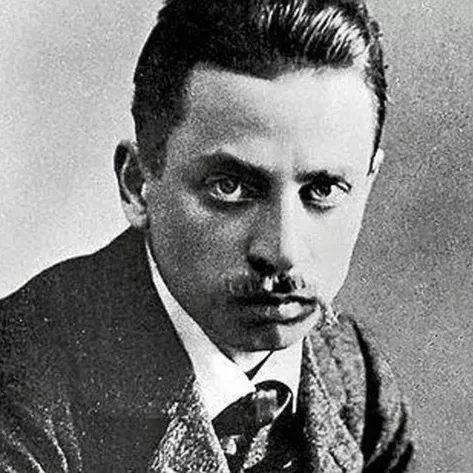
Rainer Maria Rilke (1875–1926) is considered one of the most significant poets of the 20th century, renowned for his lyrical and philosophical depth. His works, exploring themes of existential angst, spirituality, and the human condition, have captivated readers worldwide. Rilke’s ability to convey profound emotions with striking clarity and elegance has earned him a lasting place in the literary canon.
Rainer Maria Rilke Biography
Rainer Maria Rilke was born on December 4, 1875, in Prague, which was then part of Austria-Hungary. His early life was marked by turmoil and personal struggles. His father, an officer in the military, was emotionally distant, and his mother, a woman of strong character, was strict and emotionally unyielding. These difficult relationships had a profound impact on Rilke’s perception of the world and human nature.
At the age of 14, Rilke began attending a military school in Sankt Pölten, but he found the strict, regimented environment stifling. He soon left to pursue his education at the University of Prague, where he studied philosophy and art history. However, he was not drawn to academic pursuits, and his passion for writing became his primary focus.
Rilke’s literary career began to take shape in the late 1890s, when he published his first collections of poetry, including Leben und Lieder (Life and Songs), though his early work was not immediately recognized. In 1900, he moved to Munich, where he encountered many influential writers and artists, including the sculptor Auguste Rodin. This period marked a transformative phase in his career. His time spent with Rodin had a profound influence on his thinking, inspiring him to explore deeper existential themes in his writing.
Rilke’s experiences living in Paris and other parts of Europe during the early 20th century further shaped his views on life and art. His most famous work, Duino Elegies, written between 1912 and 1922, explores the nature of existence, the passage of time, and the relationship between humans and the divine. This period also saw the creation of his Sonnets to Orpheus, another key work that delves into themes of artistic creation, transformation, and the soul’s journey.
Rilke was deeply influenced by his interactions with the mystics and philosophers of his time. His writings reflect a keen sense of solitude and spiritual longing, paired with a quest for deeper meaning. In the final years of his life, Rilke moved to Switzerland, where he continued to work on his poetry despite his declining health. He passed away on December 29, 1926, in Montreux, Switzerland, from leukemia.
Walt Whitman Poems
Rainer Maria Rilke Quotes
1. “Let everything happen to you: beauty and terror. Just keep goirg. No feeling is final.”
2. “The only journey is the one within.”
3. “I am only a man, but I know the vastness of the soul.”
4. “You must change your life.”
5. “Try to love the questions themselves. Like locked roomsand like books that are written in a very foreign language.”
6. “For one human being to love another: that is perhaps thee most difficult of all our tasks, the ultimate, the last test and proof, the work for which all ofther work is but preparation.”
7. “The purpose of life is to be defeated by greater and greater thiings.”
8. “And now we welcome the new year. Full of things that have never been.”
9. “Be patient toward all that is unsolved in your heart and try to love the questions themselves.”
10. “I live my life in growing orbits, which move out over thethings of the world. I may not complete the last one, but I will give myself to it.”
Rainer Maria Rilke Facts
1. Rilke was born in Prague, which was part of Austria-Hungary atthe time, on December 4, 1875.
2. He initially studied at a military academy but later abandoned tthis path to pursue a career in writing.
3. Rilke spent much of his life traveling across Europe, living in Paris, Munich, and Switzerland.
4. He is widely regarded as one of the most significant poets of the 20th century.
5. Rilke’s most famous work, Duino Elegies, took ten years to conplete
6. He was deeply influenced by Auguste Rodin, who encouragedhim to explore the inner depths of human experience.
7. Rilke had a complicated relationship with his family, particularlywith his mother and father.
8. Despite his fame, Rilke lived in relative poverty for muchof his life, relying on the support of patrons.
9. His work blends existential and spiritual themes, often grappling with the nature of death and the human soul.
10. Rilke died of leukemia on December 29, 1926, in Montreux, Switzerland.
